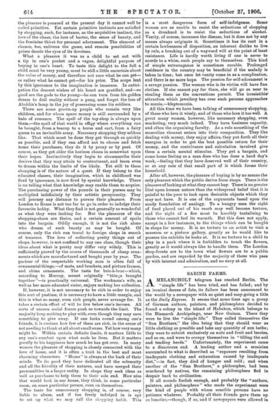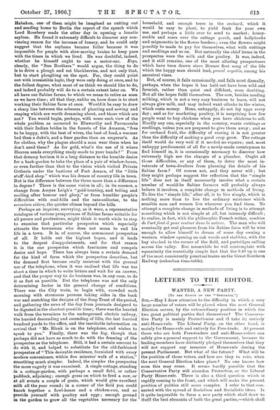SABINE FARMS.
.A.MELANCHOLY telegram has reached Berlin. The "simple life" has been tried, and has failed; and by an ironical decree of fate, its failure has been announced to the world by a newspaper with so quiet and easy-going a title as the Daily Express. It seems that some time ago a group of German authors, painters, and philosophers decided to found a colony in the island of Habakon, which belongs to the Bismarck Archipelago, near New Guinea. There they were to live the "simple life." They called themselves the "Sun Brothers," the idea being that they should wear as little clothing as possible and take any quantity of sun baths; they were to subsist exclusively on nuts and fruit and berries, and so on, and were to occupy themselves in " tilling the soil and tending herds." Unfortunately, the experiment came to a disastrous end. A leading author and a musician succumbed to what is described as "exposure resulting from inadequate clothing and exhaustion caused by inadequate diet,"—in fact, they died of hunger• and cold ; and when another of the "Sun Brothers," a philosopher, had been murdered by natives, the remaining philosophers fled in despair back to civilisation.
It all sounds foolish enough, and probably the " authors, painters, and philosophers " who made the experiment were the kind of people with whom sensible persons have no patience whatever. Probably all their friends gave them up as Innatics,—though, if so, and if newspapers were allowed in Habakon, one of them might be imagined as cutting out and sending home to Berlin the report of the speech which Lord Rosebery made the other day in opening a lunatic asylum. He found it extremely difficult to discover any con- vincing reason for the increase of lunacy, and he could only i3uggest that the asylums became fuller because it was impossible for people with slow-moving brains . to keep pace with the times in which we lived. He was doubtful, indeed, whether he himself ought to use a motor-oar. Ergo, clearly, the "Sun Brothers" would argue, the thing to do is to drive a plough and eat blackberries, and not only that, but to. start ploughing on the spot. For, they could point out:with irresistible logic, they were only doing at once, and to the fullest degree, what most of us think we should like to do, and indeed probably will do to a certain extent later on. We all have our Sabine farms, to which we mean to retire as soon as we have time ; all that they, unlike us, have done is to start working their Sabine farm at once. Would it be easy to draw a sharp line between the schemes of planting and sowing and reaping which are worth dreaming about, and those which are not P You would begin, perhaps, with some such view of the whole problem as occurred to Ebsworthy and Parracombe with their Indian brides in the forests of the Amazon, "free to be happy, with the best of wives, the best of food, a warmer bed than a duke's, and a finer garden than an emperor's. As for clothes, why the plague should a man wear them when he don't need them P As for gold, what's the use of it where Heaven sends everything ready-made to your hands ? " From that dreamy horizon it is a long distance to the humble desire for a back-garden to take the place of a pair of window-boxes, or even further than that to the vision which visited Private Ortheris under the bastions of Fort Amara, of the "little stuff'-bird shop " which was his dream of country life in town. But is the difference between the three more than a difference in degree ? There is the same vision in all; in its essence, a change from Amyas Leigh's "gold-bunting, and toiling and moiling after honour and glory," or from humbler people's difficulties with coal-bills and the rate-collector, to the aereniora sidera, the quieter climes beyond the hills.
Perhaps an inquirer, surveying, as it were, a representative catalogue of various prospectuses of Sabine farms suitable for all purses and professions, might think it worth while to stop to examine that particular prospectus which especially attracts the townsman who does not mean to end his life in a town. It is, of course, the commonest prospectus of all. It holds out the highest hopes, and it leads to the deepest disappointments, and for that reason it is the one prospectus which fascinates and compels desire and hope. There has always been a certain demand for the kind of farm which the prospectus describes, but the demand first became really insistent with the general use of the telephone, when it was realised that life was too short a time in which to write letters and wait for an answer, and that the proper way to do business was, in any case, to do it as fast as possible. But the telephone was not the only determining factor in the general change of conditions. There was the City train, to begin with, crowded each morning with strenuous persons taking sides in the book war and scotching the designs of the Soap Trust of the period, and gathering the news of the day from journals designed to be digested in the shortest possible time ; there was the hurried walk from the terminus to the underground electric railway, the hurried descending and ascending of lifts, the last hurried hundred yards to the office, and the inevitable information on arrival that " Mr. Blank is on the telephone, and wishes to speak to you." Finally, there was the fog, though that perhaps did not have as much to do with the framing of the prospectus as the telephone. Still, it had a certain amount to do with it, and helped to substitute for the old-fashioned Prospectus of " This desirable /residence, furnished with every Modern convenience, within five minutes' walk of a station," tlemething much sinipler. Indeed, the simpler the prospectui the more eagerly it was examined. A single cottage, standing in a eottage-garden, with perhaps a small field, or rather paddock, adjoining; enough grass on which to feed a cow, or at all events a couple of goats, which would give excellent Milk all the year round; in a corner of the field you could knock together a fowl-house and a chicken-run, and so fatal& yourself with poultry and eggs ; enough ground in the garden' to grow all -the• vegetables necessary for the
household, and enough trees in the orchard, which it would be easy to plant, to yield fruit for your own use, and perhaps a little over to send to market; honey- suckle and roses over the cottage porch, and hollyhocks and mignonette in the flower borders ; even the flowers might possibly be made to pay for themselves, what with cuttings and seedlings and so on. But naturally the chief items in the prospectus were the milk and the poultry. It was, indeed, and it still remains, one of the most alluring prospectuses which have been drawn since Horace first sang of the life which the happy man should lead, procul negotiis, among his ancestral vines.
But, of course, it fails occasionally, and fails most dismally, perhaps, when the hopes it has held out have been wild and feverish, rather than quiet and diffident, even doubting. Not all the hopes fulfil themselves. The cow, besides needing milking, which is not a very easy business to learn, will not always give milk, and may indeed want oilcake in the winter, which costs money. Hens, unhappily, do not lay eggs every day ; and as for marketing poultry, it is surprising how few people want to buy chickens when you have chickens to sell: Hardly any one, especially in the country, wants cuttings or seedlings, unless you are prepared to give them away ; and as for orchard fruit, the difficulty of storing it is not greater than the difficulty of making a good crop grow. The cottage itself would do very well if it needed no repairs; and, most unhappy predicament of all for a newly-made countryman to find himself in, it is occasionally necessary to discover how extremely high are the charges of a plumber. Ought all those difficulties, or any of them, to deter the most in- veterate of town-dwellers from planning the details of his Sabine farm P Of course not, and they never will ; but they might perhaps suggest the reflection that the " simple life" does not in itself necessarily involve what a certain number of would-be Sabine farmers will probably always believe it involves, a complete change in methods of living. To live the " simple life," after all, is to live simply, which is nothing more than to live the ordinary existence which sensible men and women live wherever you find them. To attempt a complete change in methods of living is to attempt something which is not simple at all, but intensely difficult ; to realise, in fact, with the philosophic French writer, combien de roll faut•il pour rentrer dans la nature. The man who will eventually get real pleasure from his Sabine farm will be wise enough to allow himself to dream of some day owning a western window opening on oak woods and stubbles, with the hay stacked in the corner of the field, and partridges.calling across the valley. But meanwhile he will contemplate with equanimity the essentially simple fact that the 8.40 up is one of the most consistently punctual trains on the Great Southern Railway (suburban time-table).















































 Previous page
Previous page